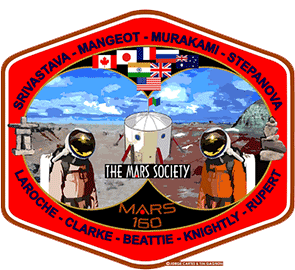Final Report of Anushree Srivastava
Anushree Srivastava – Mars 160 phase one final words
Mars 160 mission in the Utah Desert is towards its end. I think we have not just performed a Mars simulation but lived a life, a life which was entirely different from what we had been living. It is a bonding that we have created with our Hab and with each other. We became a family. We had our both stressful and funny moments like all families have, but I think somewhere, we all learned to be unconditional in our approaches to ensure the harmony inside our isolated Martian home. I was going to jot down things that I would miss, but I think, I am going to miss everything.
Being part of a long-term Mars simulation mission and living in an isolated condition is not easy. You tend to feel monotony sometimes or want to stay confined into your own world, but then your WORK reminds you the love you kept harbouring in your heart and you crossed all the boundaries to chase it, to achieve it. You remind yourself that you are working for a mission that not everyone has the opportunity to be part of. I think, to not to lose the perspective is the biggest challenge of a long term simulation mission. The most wonderful thing I found about our sojourn at MDRS is – we lived and grew beautifully. It is simple to say and sounds idealistic, but we have done it.
I am coming back to MDRS as Crew Biologist and the Executive Officer of Crew 172. So, I will be carrying forward my Mars 160 science goals in the Utah desert for another fifteen sols. Mars160 mission is not over yet. Now, with the culmination of the first phase of this mission, there is a dawn of another phase, hope, and challenge – the Arctic. Our mission in the Arctic is going to be much more challenging, in terms of field science, safety and habitability. The first phase was a test of our efficiency as a crew and the patterns of mission operation, to prepare us for the practicalities and upcoming hardships of living in a true extreme environment of the Arctic. We were supposed to learn what worked and what not, in order to apply those lessons when we embark on the Arctic mission. I still remember that it was a ‘mission’ for me even to arrive at MDRS. I believe this tryst of me and my work is what kept me going through these 80 sols and will continue to do so for another 80 sols.



